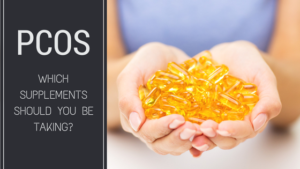 When it comes to PCOS, everyone wants to know which supplements are the most effective. Outlined below are a number of popular and effective supplements which have proven benefits for those who suffer from this common cause of infertility.
When it comes to PCOS, everyone wants to know which supplements are the most effective. Outlined below are a number of popular and effective supplements which have proven benefits for those who suffer from this common cause of infertility.
What is Polycystic Ovary Syndrome (PCOS)?
PCOS – the leading cause of infertility in women – is a prevalent health issue caused by an imbalance in reproductive hormones. This imbalance creates ovarian complications often leading to anovulatory cycles (not able to ovulate) and can therefore make it difficult for those affected to conceive.
The ovaries are responsible for releasing a mature egg every month, which is part of the natural menstrual cycle. Women with PCOS may experience underdeveloped egg production, which can result in the egg not being released at all. Or if an egg is released, its quality may be too low for fertilization to occur.
In addition, it is worth noting that the word “polycystic” implies that multiple ovarian cysts are part of the PCOS picture, however this may not always be the case. One term I sometimes hear from RE’s (Reproductive Endocrinologists) is “PCOS ish” or “PCOS like”…referring to women who don’t have all the traditional PCOS symptoms (see below).
Affected Hormones
Several hormones can be affected with PCOS:
- Luteinizing Hormone (LH) and Follicle-Stimulating Hormone (FSH)
- Testosterone
- Androgens
- Progesterone
- Insulin
- Anti-Mullerian Hormone (AMH)
LH and FSH
Both of these hormones play a role in ovulation. When in balance, LH and FSH should exist at roughly a 1:1 ratio.
For women with PCOS, this ratio becomes skewed, sitting at about a 3:1 ratio LH:FSH. This imbalance alone is enough to impact the ovulation process.
Testosterone
Women with PCOS tend to have heightened testosterone levels which can lead to the suppression of menstruation and ovulation.
Androgens
Androgens are sometimes referred to as “male hormones”, but females have these hormones as well. Increased levels of androgens in women can result in irregular hair growth and infertility.
Progesterone
Progesterone is a type of steroid hormone that triggers the uterus to get ready for pregnancy. Progesterone levels are a good indicator for whether or not an egg has been released during ovulation.
Insulin
Recent studies indicate that PCOS may be caused by the body’s resistance to insulin. High glucose levels in the body can signify insulin resistance, which can lead to further health issues.
Anti-Mullerian Hormone
AMH is a hormone that gets released by the follicles in growing egg sacs. AMH tests are often used to provide a clearer picture of a women’s ovarian reserve (amount of viable eggs remaining for potential fertilization).
I often have clients who have gone forward with fertility testing without any knowledge of having PCOS and it is their very high AMH result which point to the diagnosis. High AMH levels are a diagnostic for PCOS – if your AMH comes back excessively high, ask your doctor if PCOS may be the reason.
Pregnant women with PCOS have been found to have higher levels of AMH in their blood. This suggests that PCOS may be passed on genetically.
Also noteworthy, too much AMH can result in a testosterone imbalance in pregnant mothers, this imbalance may cause an excess of androgen hormones in the offspring.
Symptoms of PCOS
The symptoms associated with PCOS can be difficult to detect, and a diagnosis is rarely made on symptoms alone.
However, there are some warning signs that can help you recognize it:
- Irregular menstrual cycle (maybe having only 2-3 periods in a year)
- Hirsutism – abnormal hair growth on the face and body
- Hair loss or thinning on the head
- Weight issues – difficulty losing and unexplained weight gain
- Acne outbreaks on the face and body
- Oily skin
- Skin tags
- Skin discolouration
- Sleep issues and fatigue
- Headaches
- Of course…infertility
Causes of PCOS
This is a very complex condition, and a definitive cause is still unknown. The most widely accepted and agreed upon causes are:
- Excess levels of insulin
- Excess levels of androgens
- Genetics
Insulin Excess
Women with PCOS tend to have high levels of insulin in their blood stream. This is typically caused by insulin resistance, as the body does not respond normally to insulin production. This can lead not only to fertility issues, but also type 2 diabetes.
Excess Androgens
Androgen hormones are generally responsible for male traits like male-pattern baldness, as well as facial and underarm hair.
Women with PCOS have elevated levels of androgen hormones, which can disrupt ovulation and menstruation.
Genetics
Doctors and researchers are beginning to believe that PCOS is passed from mother to child because of too much AMH hormone present during pregnancy. This offsets the hormonal balance in the mother, causing a reaction in the hormonal balance of the unborn child.
Hormonal function and balance is an incredibly delicate and complicated process.
Treatments for PCOS
Although PCOS is still an incurable disorder it is treatable and there is hope that a more permanent solution will be found in the near future.
A diagnosis of PCOS does not mean that you can’t get pregnant. However, you may just have to work a little harder to do so. PCOS is a common cause of infertility in women, and there are many approaches to treatment that are available – both medical and natural.
In my clinic, the most important things people with PCOS can do is to modify their diet (low refined carbohydrates), get regular exercise and incorporate a well thought out supplement regime.
“Must-Have” PCOS Supplements
Several supplements have proven effective in managing PCOS which can ultimately improve the chances of pregnancy. Be sure to talk to someone who can help you with dosages which are right for your situation.
Some of the most commonly researched supplements for PCOS include:
- Myo-Inositol
- Vitamin D
- Omega 3 and Vitamin E
- CoQ10
- NAC – N-Acetyl Cystein
Myo-Inositol
Myo-Inositol is a substance that occurs naturally in the body and is part of the vitamin B-complex group.
Regular doses of Myo-Inositol have been found to:
- Restore the LH:FSH ratio balance to closer to 1:1
- Reduce testosterone
- Reduce insulin levels in the blood
- Decrease androgen production
- Works like an antioxidant
- Helpful with egg maturation
Vitamin D
A rapidly growing percentage of the population are deficient in vitamin D. Whether this is due to increasingly unhealthy lifestyles, or the avoidance of a harsher sun due to ozone depletion, the results are the same.
Vitamin D deficiency has been associated with things like:
- Bone degradation
- Muscle weakness
- Insulin resistance
- Increased androgen production
- Ovulation and menstrual complications
- Infertility
To boost vitamin levels, you can:
- Maintain a vitamin D rich diet – fatty fish, healthy oils, eggs, milk
- Get out in the sun more (in moderation)
- Take vitamin D supplements – these can either be purchased over the counter or prescribed by a doctor (vitamin D3 is the “type” of vitamin to look for)
Omega 3 and Vitamin E
Supplement your diet with regular doses of omega 3s and vitamin E.
Omega 3s are known to help reduce testosterone levels and hirsutism in females with PCOS. They can also contribute to improving the body’s sensitivity to insulin.
Vitamin E supplements can also be helpful for women with PCOS by increasing the thickness of the uterine lining for a more stable environment, and improving glucose metabolism to reduce insulin levels in the blood.
CoQ10
Coenzyme Q10 is an essential and naturally occurring element in the human body. It is necessary in every living cell, to help carry out many routine functions.
CoQ10 supplements can:
- Work like antioxidants to reduce oxidative stress
- Oxidative stress can damage egg quality
- Help lower insulin levels in the blood
- Help regulate ovulation
- Improve fertility
NAC
N-Acetylcysteine (NAC) is also sometimes referred to as the super nutrient. NAC is a powerful antioxidant that can help boost the immune system and treat PCOS.
Some of the benefits of NAC are:
- Improves insulin resistance by protecting insulin receptors
- Reduces androgens
- Helps regulate menstruation
- Restores hormonal balance
- Decreases hirsutism
- Reduces testosterone
- Fights oxidative stress
- Boosts fertility
Remember, supplements aren’t the only things you should be thinking about when treating this common infertility concern. Diet and lifestyle play a huge role in the successful treatment of PCOS and should be considered paramount. Talk to a practitioner who is familiar with all of these areas and you will be giving yourself the best chance at success.
References
https://www.ncbi.nlm.nih.gov/pubmed/29042448
https://www.ncbi.nlm.nih.gov/pubmed/28679142
https://www.ncbi.nlm.nih.gov/pubmed/28407657
https://www.ncbi.nlm.nih.gov/pubmed/27911471


